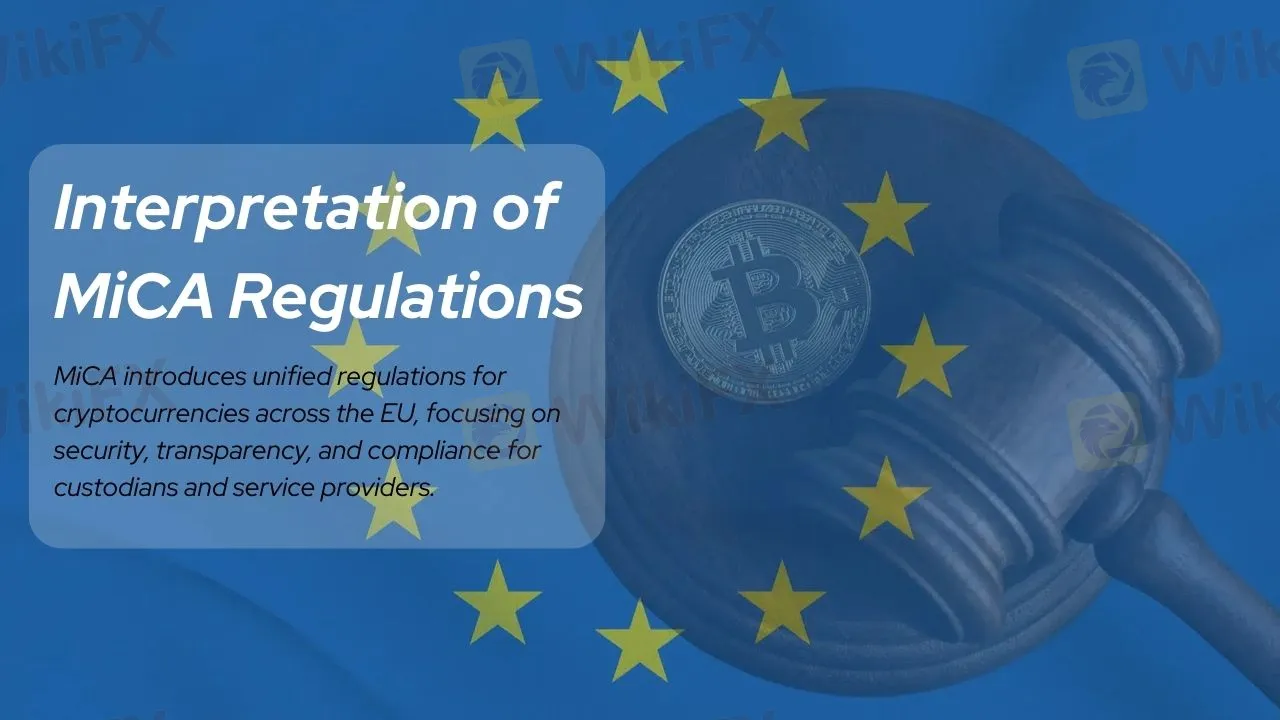Interpretation of MiCA Regulations
Abstract:The Markets in Crypto-Assets Regulation (MiCA) aims to harmonize cryptocurrency regulations across the European Union, providing legal certainty for issuers and service providers. It establishes a framework to regulate cryptocurrencies, stablecoins, and other digital assets while defining the rights and obligations of virtual asset custodians. These custodians are tasked with safeguarding and managing digital assets on behalf of clients and are now subject to stringent regulatory requirements to ensure security, transparency, and compliance.

Timeline and Key Definitions
MiCA was proposed by the European Commission in 2020 and came into force on June 30, 2023. Not all rules became effective immediately; regulations for stablecoin issuers took effect on June 30, 2024, with additional provisions applied starting December 30, 2024. During this transitional period, crypto asset service providers operating before December 30, 2024, can continue their services until July 1, 2026, by which time they must obtain proper licenses.
MiCA also introduces critical definitions, such as:
- Crypto Asset: A digital representation of value or rights, transferable and storable via distributed ledger technology.
- Asset-Referenced Token: A crypto asset maintaining value stability by referencing another value, such as fiat currency or a basket of assets.
- Crypto Asset Service Provider (CASP): Legal entities authorized under Article 59 to provide crypto asset services, including custody, trading, and advisory services.
Custodianship and Compliance
MiCA represents a significant shift for virtual asset custodians, mandating stricter obligations to enhance transparency and security. Custodians must maintain separate accounts for client assets, establish robust custody procedures, and adopt detailed agreements outlining responsibilities and safety measures. Importantly, custodians are now explicitly liable for asset losses or lost access keys, increasing accountability for security breaches or operational failures.
Custodians must comply with several regulatory requirements, including:
- Governance: Establish effective management systems, ensure personnel qualifications, and adopt robust ICT systems for business continuity.
- Capital Requirements: Maintain minimum capital of €125,000 or one-fourth of the previous years fixed overhead costs.
- Conflict of Interest Disclosures: Provide detailed conflict disclosures on their websites, ensuring transparency for clients.
- Custody Agreements: Define the scope of services, communication methods, and safety systems in written agreements with clients.
- Custody Policies: Develop policies to minimize risks related to asset loss, fraud, or cybersecurity threats.
Conclusion
MiCA establishes a structured regulatory environment, emphasizing security, transparency, and compliance across the EU‘s crypto industry. While the stricter requirements present challenges for custodians, they also create opportunities for those who adapt and innovate. The regulation’s full impact is becoming clearer, and it is expected to inspire further enhancements to address gaps and ensure market stability.
Read more

US Crypto Fraud Losses Jump 66% in 2024, Reaching Alarming Highs
Crypto-related scams cost U.S. investors $9.3 billion in 2024, marking a 66% surge from the previous year, with seniors and fake investment schemes among the hardest hit.

UN Warns Asian Scam Operations are Spreading Worldwide
UN report reveals Asian scam operations expanding globally, targeting Africa, Latin America with cyberfraud, generating billions amid crackdowns.

Why Binance Tightens Crypto Transfer Rules for South Africans?
Binance enforces stricter crypto transfer rules for South African users starting April 30, requiring sender and beneficiary details for compliance.

KuCoin Thailand Launches as Top Crypto Exchange in 2025
KuCoin Thailand launches with SEC approval, offering secure crypto exchange services and digital asset trading in Thailand with enhanced technology and safety.
WikiFX Broker
Latest News
Coinbase Eyes U.S. Federal Bank Charter for Crypto Growth
Why People Fall for Online Trading Scams
Germany’s April PMI Falls Below 50 as Service Sector Stumbles
PayPal Opens Regional Hub in Dubai, Expands Middle East Reach
FINRA fines SpeedRoute for alleged rule violations
RM15,000 Profit Turned into RM1.1 Million Loss for Engineer!
New to FX Trading? Stop! Read These Warnings First
Prop Trading Firms vs. CFD Brokers: Who’s Winning the Retail Trading Race?
TRADE.com UK Sold to NAGA Group Amid 2024 Revenue Drop
World Trading Tournament (WTT): The Game-Changer in Global Trading
Rate Calc
